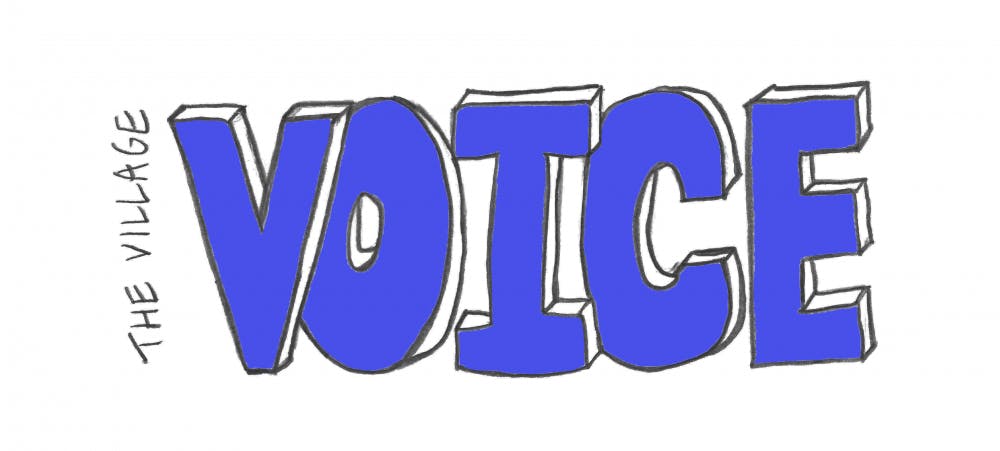I’ve never held a copy of the Village Voice in my hands. I’ve never lived in Greenwich Village, or New York at all. In fact, I never had much of a direct relationship with the counterculture alt–weekly at all, and the little I did know about it was secondhand information from my former–hippie father. Nonetheless, my heart felt an unexpected twisting ache when the paper announced last week that it would no longer publish new material.
Its death came as no surprise, joining the growing list of culture–focused publications like Interview or Rolling Stone that have recently gone under or been sold to new ownership. The shock is really that it lasted as long as it did, considering its frequent coverage of local music and art that appealed to niche audiences more than the mainstream–in other words, the New York underground. Dr. Anthony DeCurtis, a Penn English professor and long–time music journalist, grew up right around the corner from the Village Voice offices in Greenwich Village. “As my political consciousness grew as a teenager in the Sixties, the Voice became my source for information that you couldn't get anywhere else,” he wrote in an email. “For a while in my teens, I vowed that I wouldn't make my mind up about an issue like the Vietnam War until I read what the Voice had to say about it.”
It never had a chance against heavyweights like Rolling Stone or Vanity Fair, but standing in the shadows of these giants kept its opinions vibrant and honest. In the decades following its 1955 inception, the Voice’s columnists, cartoonists, and critics ignored the pre–determined boundaries of stuffy journalism to innovations in creative nonfiction like Gonzo and New Journalism. “Culturally, the Voice took rock & roll seriously very early, and writers like Richard Goldstein had a major impact on me,” writes DeCurtis. The paper was one of the few that helped legitimize the free and unlimited expression of mid–twentieth century America by regularly covering stories on artistic movements like fluxus or the explosion of New York punk in clubs like CBGB.
But more than anything the Voice was just that–a voice for those that were underrepresented by the mainstream media. But now that same New York culture is everywhere, with no central location. “Any storied publication going under is a loss, a loss of community, accountability and intelligence,” says magazine journalism professor Dr. Avery Rome here at Penn. “Losing the Village Voice is a very sad example of that trend.”
That community of artistic risk and thrill is one I’ve been contemplating for years now. I am an engineering student, not an English student. I know that every path in life is full of its own breed of excitement and risk, but I often feel that the choices ahead of me are relatively safe ones. Whether I pursue consulting or industry work or academia, I’ve never worried that hard work and an engineering degree from Penn will have me rubbing pennies together down the road (*knock on wood*).
My parents would cringe at the words I’m about to write, but sometimes I dream about what it would be like to take a chance on a career in journalism, to pursue a future full of mystery with no real plans other than to take advantage of any and all writing opportunities. In hopes to prove the possibility of this to myself, I compiled a list last June of places that still wrote bravely and unabashedly about human culture, despite a dramatically shrinking readership. The Village Voice was one that reflected all that I love in artistic rebellion, from the names that graced its many covers to those who wrote the stories behind them. After so many people beating me down with the tired mantra that there’s no future in a writing career, the Voice and others like it were a beacon of hope proving all of those nonbelievers wrong.
Now its folding makes me wonder if these dreams will ever become more than that. But part of me knew the Voice, and those like it, would probably never have been a part of my future. Long past its heyday, “the paper’s music writing became impossibly self–involved and pretty much unreadable,” says DeCurtis. In hindsight, it seemed to have been in hospice care for a while. But does that now make the basis of its founding irrelevant?
I don’t think so. In fact, the accessibility the Internet created to any and all kinds of music paired with the growing presence of smart devices that have begun to make some choices for us demands a new centralization of the new underground. Predicting what this might look like in such a fast–paced world of information is difficult, but so long as there are artists out there working more for the sake of art than for that of money, a voice will be needed to help bring that work to light–that is the voice I hope to one day join in my writing.







